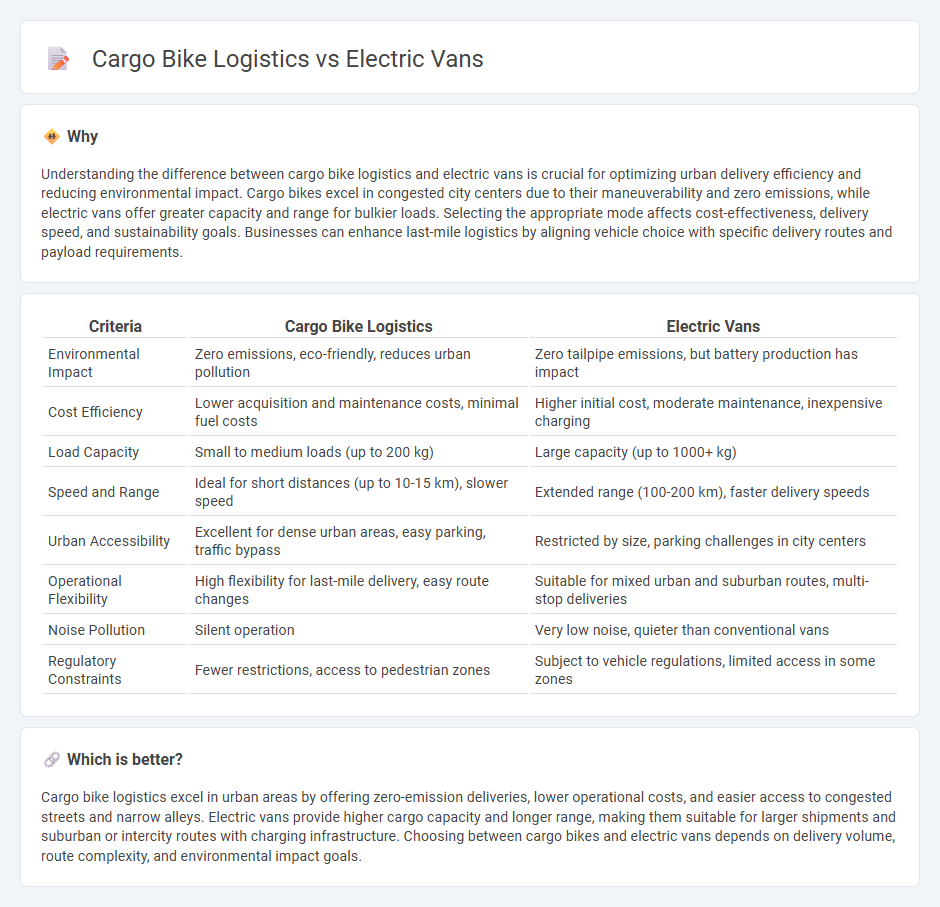
Cargo bike logistics offers eco-friendly, efficient last-mile delivery solutions in congested urban areas, reducing carbon emissions and traffic delays compared to traditional electric vans. Electric vans provide greater cargo capacity and longer range, supporting heavier loads and extended routes, yet face challenges with parking and maneuverability in dense city streets. Explore how combining cargo bikes and electric vans can optimize urban logistics for sustainability and operational efficiency.
Why it is important
Understanding the difference between cargo bike logistics and electric vans is crucial for optimizing urban delivery efficiency and reducing environmental impact. Cargo bikes excel in congested city centers due to their maneuverability and zero emissions, while electric vans offer greater capacity and range for bulkier loads. Selecting the appropriate mode affects cost-effectiveness, delivery speed, and sustainability goals. Businesses can enhance last-mile logistics by aligning vehicle choice with specific delivery routes and payload requirements.
Comparison Table
| Criteria | Cargo Bike Logistics | Electric Vans |
|---|---|---|
| Environmental Impact | Zero emissions, eco-friendly, reduces urban pollution | Zero tailpipe emissions, but battery production has impact |
| Cost Efficiency | Lower acquisition and maintenance costs, minimal fuel costs | Higher initial cost, moderate maintenance, inexpensive charging |
| Load Capacity | Small to medium loads (up to 200 kg) | Large capacity (up to 1000+ kg) |
| Speed and Range | Ideal for short distances (up to 10-15 km), slower speed | Extended range (100-200 km), faster delivery speeds |
| Urban Accessibility | Excellent for dense urban areas, easy parking, traffic bypass | Restricted by size, parking challenges in city centers |
| Operational Flexibility | High flexibility for last-mile delivery, easy route changes | Suitable for mixed urban and suburban routes, multi-stop deliveries |
| Noise Pollution | Silent operation | Very low noise, quieter than conventional vans |
| Regulatory Constraints | Fewer restrictions, access to pedestrian zones | Subject to vehicle regulations, limited access in some zones |
Which is better?
Cargo bike logistics excel in urban areas by offering zero-emission deliveries, lower operational costs, and easier access to congested streets and narrow alleys. Electric vans provide higher cargo capacity and longer range, making them suitable for larger shipments and suburban or intercity routes with charging infrastructure. Choosing between cargo bikes and electric vans depends on delivery volume, route complexity, and environmental impact goals.
Connection
Cargo bike logistics and electric vans enhance urban delivery efficiency by combining zero-emission vehicles with flexible last-mile transport solutions. Integrating electric vans for bulk transport and cargo bikes for navigating congested city centers reduces carbon footprints and traffic congestion. This synergy supports sustainable logistics strategies, meeting environmental regulations and urban mobility challenges.
Key Terms
Last-mile delivery
Electric vans offer higher payload capacity and longer range, making them suitable for bulk last-mile deliveries in urban and suburban areas. Cargo bikes excel in congested city centers, providing faster navigation through traffic, zero emissions, and lower operational costs for small parcel shipments. Explore how these solutions can transform your last-mile delivery strategy for enhanced efficiency and sustainability.
Payload capacity
Electric vans offer significantly higher payload capacity, typically ranging from 1,000 to 1,800 kilograms, making them suitable for transporting large quantities of goods over long distances. Cargo bikes, on the other hand, usually carry payloads between 100 to 250 kilograms, ideal for last-mile delivery in urban environments with limited space. Discover how optimizing payload capacity influences the choice between electric vans and cargo bikes for efficient logistics.
Urban access regulations
Electric vans offer greater cargo capacity and speed, but face urban access restrictions such as low-emission zones and congestion charges that limit their operation in dense city centers. Cargo bikes can bypass many of these regulations due to their smaller size and zero emissions, enabling easier access to pedestrian zones and tighter streets. Explore detailed comparisons on urban logistics strategies to optimize your delivery performance.
Source and External Links
Here are 10 good electric vans if you need... a good electric van - Offers detailed info on 10 impressive electric vans including the Ford e-Transit, Volkswagen ID. Buzz Cargo, Renault Kangoo E-Tech with up to 186 miles of range, and Peugeot e-Partner among others in the small van category.
Best electric vans 2025 - charged, tried and tested - What Car? - Reviews 2025's top electric vans emphasizing models like the Toyota Proace City Electric with a 50kWh battery and 171 miles range, noting strengths such as rapid charging and extensive warranties.
Best Electric Vans and Minivans for 2025, Tested - Provides expert-tested rankings of electric vans including the 2025 Volkswagen ID.Buzz Microbus with 231-234 miles range, Mercedes-Benz eSprinter, Ford E-Transit, and Ram ProMaster EV based on extensive real-world driving data.
 dowidth.com
dowidth.com